Created as the first opera for Berlin’s new Konzerhaus, Weber’s Der Freischütz immediately captured the audience’s attention. The applause was hysterical and soon all of Berlin had its catchiest melodies conquered, singing or whistling the Huntmen’s Chorus or the Bridesmaid’s Song. The premiere on 18 June 1821 was the start of an extraordinary run – Der Freischütz became one of the most frequently performed operas in the 19th century, and even if we are really only familiar with the overture today, it remains in the repertoire. Staged productions in 2025 include the Bregenzer Festspeiele in Austria, Bad Elster in Germany, and concert performances in the United States and France.
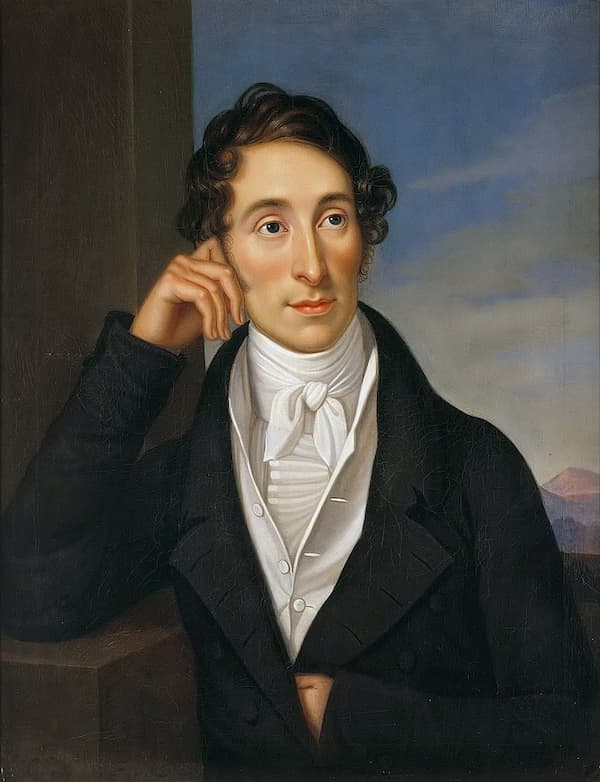
Caroline Bardua: Carl Maria von Weber, 1821 (Berlin Nationalgalerie)
Der Freischütz (The Marksman) uses the early 19th century interest in the supernatural to bring out a story of a shooting competition where our hero (Max) has just lost to the peasant Kilian. For Max to marry his beloved, Agatha, he must win the next competition to impress her father, Kuno, and succeed to his job as head forester.
Max falls in with Kaspar, the first assistant forester, who also wanted Agatha before she chose Max. Kaspar gives him a gun loaded with a magic bullet that Max uses to strike a bird that he would have normally considered far out of range. Kaspar arranges that the two men will meet at the Wolf’s Glen so they can cast more of the magic bullets.
At the Wolf’s Glen, Kaspar summons up Samiel, the Black Huntsman, aka the devil. In a separate deal with Samiel, Kaspar offers him Max’s soul (Kaspar’s has already been pledged) and in exchange, the magic bullets will kill Agatha and Kaspar’s soul will be redeemed in exchange with Max’s. Frightening creatures appear, the wild hunt passes by in the air, and even the ghost of Max’s mother appears to try to stop him. All to no good – the seven bullets are cast.
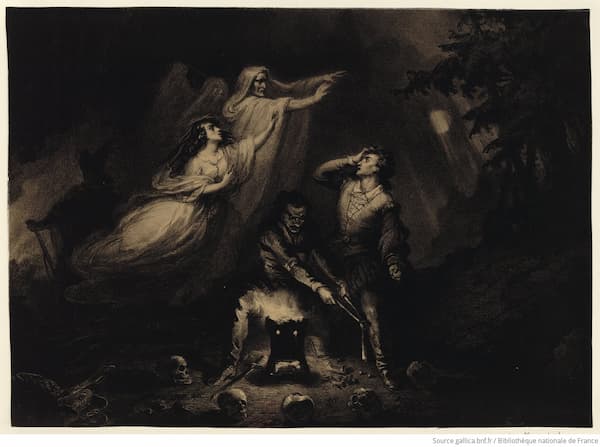
The Wolf’s Glen scene and casting bullets (Gallica: btv1b84377096)
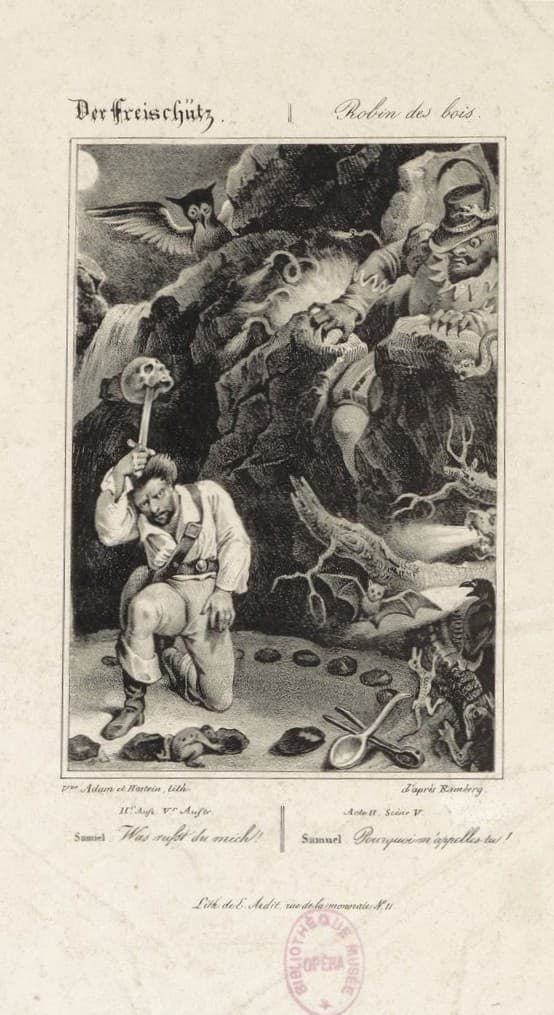
Adam de Victor: The Wolf’s Glen Scene, 1830s (Gallica: btv1b8437708)
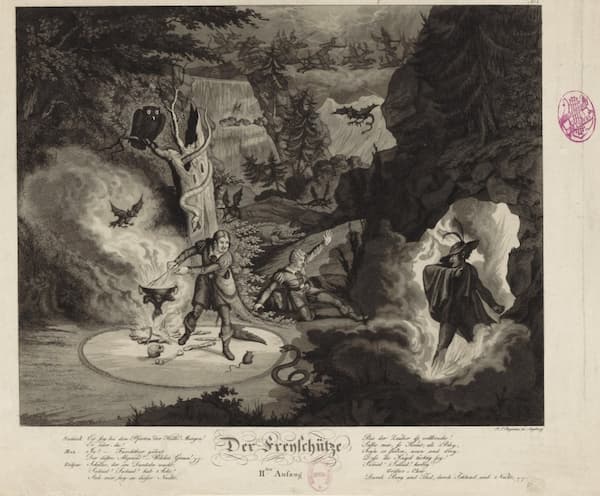
The Wolf’s Glen Scene, 1821-1826 (Gallica: btv1b84377044)
Kasper and Max use 6 of the bullets on the day’s hunt. The Devil’s bullet remains for the final trial.
At the trial, in front of Prince Ottokar, Max’s bullet doesn’t hit the appointed dove, but strikes, gasp, Agatha. She falls, but it turns out that her bridal bouquet, given to her by a hermit, has deflected the bullet, and it strikes Kaspar. Samiel takes away his new victim, and explanations are due to the Prince. His first reaction is to forbid the marriage and to banish Max for his magic bullets. In the end, though, he agrees to a one-year probation before he can marry Agatha, and the Prince himself will preside over the marriage.
The sacred service of the hermit saves the bedevilled hunter – good wins over bad. And, in the Wolf’s Glen scene, designers all over the world had the opportunity to go crazy with a wild, supernatural scene.
Carl Maria von Weber: Der Freischütz, op. 77
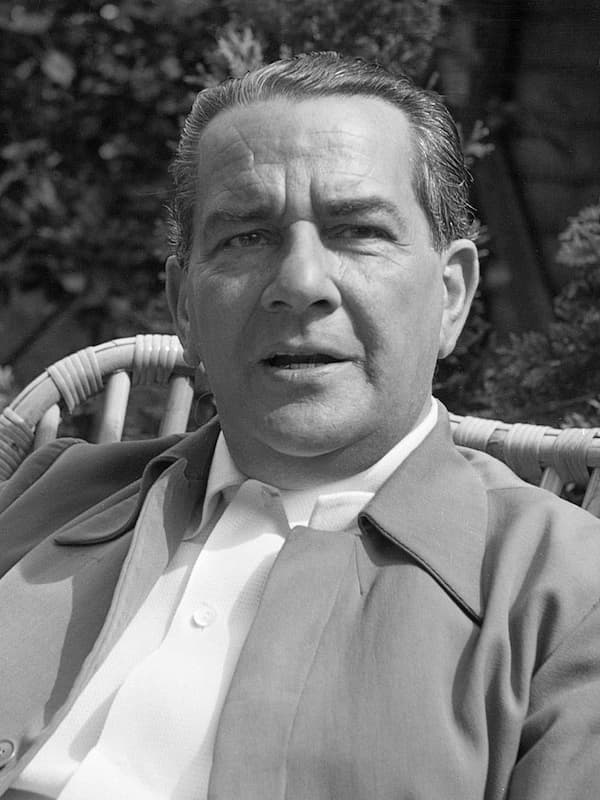
Eduard van Beinum
This recording was made in 1955 for radio broadcast by The Cleveland Orchestra led by Eduard van Beinum. Dutch conductor Van Beinum (1900–1959) started as a violinist and pianist before finding his feet as a conductor at the Amsterdam Conservatoire. In 1931, he was second conductor of the Concertgebouw Orchestra under Willem Mengelberg, rising to co-principal conductor in 1938. During the war, Mengelberg was dismissed because of his anti-Nazi behaviour, but van Beinum was able to keep his position, albeit with difficulty. In the US, he conducted the Philadelphia Orchestra in 1954 and was music director of the Los Angeles Philharmonic from 1956 to 1959. He died on the Concertgebouw podium during a rehearsal of Brahms’ Symphony No. 1.
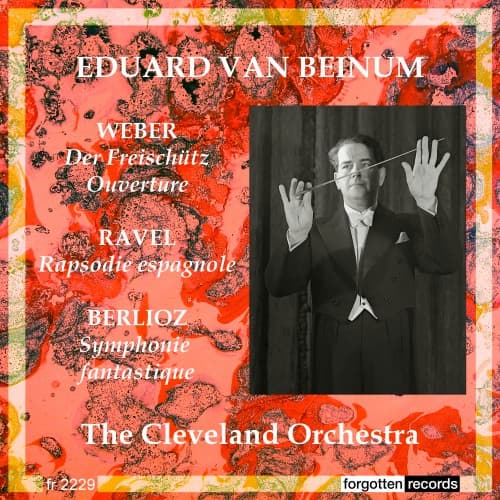
Performed by
Eduard van Beinum
The Cleveland Orchestra
Recorded in 1955
Official Website
For more of the best in classical music, sign up for our E-Newsletter
